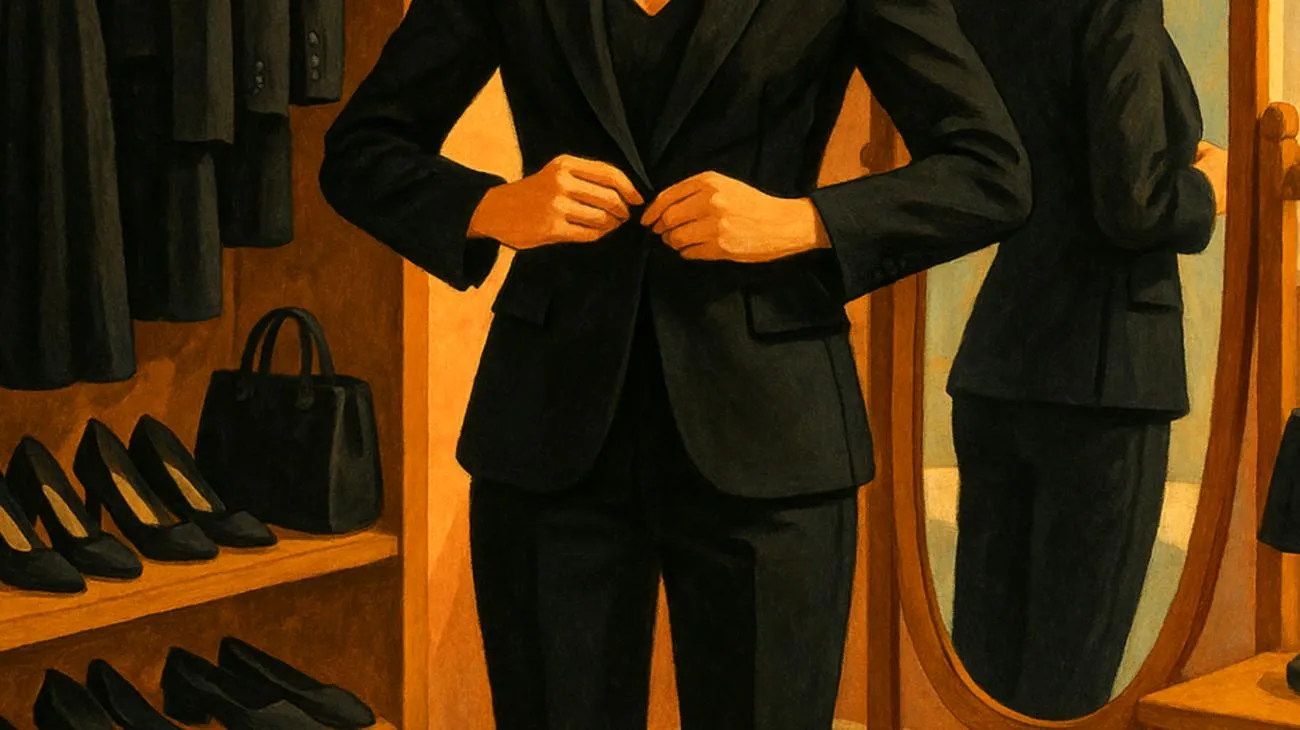You know that friend who opens their closet and it looks like they’re preparing for a perpetual funeral? Or maybe you’re reading this while wearing your fifth black outfit this week, wondering if your wardrobe choices are sending some kind of psychological SOS signal to the universe. Well, buckle up, because we’re about to dive deep into the fascinating world of all-black-everything psychology, and spoiler alert: it’s way more complex than you think.
Before you start side-eyeing your black abaya collection or questioning your life choices, let’s get one thing crystal clear: most people who love wearing black are completely normal, thank you very much. But psychology has some pretty interesting things to say about what drives this preference, especially when it crosses the line from “I look good in black” to “I literally cannot function in any other color.”
The Power Move You Didn’t Know You Were Making
Here’s something that might blow your mind: when you slip on that black outfit every morning, you’re essentially putting on psychological armor. Color psychology research shows that people who gravitate toward black clothing are often seeking to project authority, sophistication, and control. Think about it—when was the last time you saw a judge in a bright yellow robe or a CEO giving a boardroom presentation in hot pink?
The psychology behind this is pretty straightforward but absolutely fascinating. Black has been associated with power and authority across cultures for centuries. When you choose black, you’re tapping into this collective unconscious association. Your brain knows that black makes you look serious, competent, and not to be messed with. It’s like having a confidence booster hanging right there in your wardrobe.
But here’s where things get interesting for our Emirati readers: this power dynamic works differently across cultures. In the UAE, black traditional wear like abayas carries its own cultural significance tied to elegance, modesty, and heritage. The psychological boost from wearing black layers on top of these cultural meanings, creating a double dose of confidence and identity reinforcement.
Research in color psychology suggests that individuals who consistently choose black score higher on measures of self-assurance and leadership potential. So if you’re obsessed with black, you might actually be the most confident person in the room, using color as a tool to express your inner strength rather than hide your insecurities.
The Emotional Shield Theory That Changes Everything
Ever notice how wearing black can make you feel invisible in a crowd when you want to be, but powerful when you need to be? That’s not your imagination—that’s your brain using clothing as an emotional regulation tool. Many people who exclusively wear black are unconsciously using it as what psychologists call an emotional shield.
This behavior stems from something researchers call emotional regulation through external means. Basically, you’re using your clothing to manage how you feel and how others perceive you. Black becomes your go-to because it’s neutral, non-threatening, and doesn’t draw unwanted attention to specific aspects of yourself you might be feeling sensitive about.
For people dealing with social anxiety or heightened sensitivity to their environment, black clothing provides a sense of psychological safety. It’s like wearing social camouflage that helps you blend into the background when interactions feel overwhelming. The color’s ambiguous nature makes you harder to read, which can feel protective when you’re navigating complex social situations.
But here’s the crucial distinction: this becomes potentially problematic only when this coping mechanism becomes so rigid that the thought of wearing any other color triggers genuine distress. Most people using black as an emotional tool are making a healthy adaptive choice, not displaying pathological behavior.
The Perfectionist’s Secret Weapon
Ready for a plot twist? Choosing to wear only black might actually be the ultimate perfectionist move disguised as simplicity. When everything in your wardrobe is black, you never have to worry about clashing colors, outdated patterns, or making the wrong fashion choice. You’ve essentially hacked the decision-making process.
This elimination of choice reduces what psychologists call decision fatigue. By removing color coordination from your daily routine, you’re freeing up mental energy for other decisions. This isn’t just theoretical—research on simplified decision processes shows that reducing routine choices can actually improve cognitive performance in other areas of your life.
People with monochrome wardrobes often score higher on measures of conscientiousness and attention to detail. They’ve identified what works and committed to it, which speaks to both practical intelligence and a preference for reliability over variety. It’s efficiency disguised as fashion.
The key difference between healthy simplification and problematic rigidity lies in flexibility. If wearing a dark navy shirt instead of black causes genuine distress, or if you’ve avoided social events because you don’t have the right black outfit, your relationship with this color choice might need some examination.
When Black Becomes Your Comfort Zone Prison
Now, let’s address the elephant in the room—or should we say, the black elephant. While preferring black clothing is absolutely not a mental disorder, there are rare instances where this preference can become inflexible enough to cause problems in daily life.
Clinical psychology recognizes that extreme clothing-related rigidity can sometimes indicate underlying issues with control, anxiety, or compulsive behaviors, but this is relatively uncommon and usually accompanied by other symptoms. The concern arises when the preference becomes so inflexible that it interferes with normal functioning.
Warning signs might include feeling genuinely panicked at the thought of wearing other colors, avoiding social situations because appropriate black clothing isn’t available, or experiencing physical symptoms of anxiety when required to wear non-black items. If your black clothing preference is accompanied by other rigid behaviors or significantly impacts your quality of life, it might be worth exploring with a mental health professional.
However, it’s crucial to understand that for most people, even those with a strong preference for black, this represents healthy self-expression and practical decision-making, not psychological distress.
Breaking Free From the Monochrome Trap
If you’ve recognized yourself in this exploration and feel like your relationship with black clothing might be limiting your self-expression, there are practical ways to expand your comfort zone without completely overhauling your wardrobe.
- Start microscopic: Try incorporating very dark colors that feel similar to black, like charcoal gray, deep navy, or dark brown
- Experiment with textures and patterns: Keep the black color but try different fabrics, cuts, or subtle patterns to add variety without changing colors
- Add tiny accents: Introduce minimal pops of color through accessories like jewelry, watches, or bags
- Question your motivations: Before getting dressed, pause and ask yourself why you’re choosing black—is it genuine preference or anxiety avoidance
Remember, the goal isn’t to abandon black if you genuinely love it. The aim is ensuring your clothing choices come from empowerment and preference rather than fear or compulsion. Your wardrobe should enhance your life, not limit it.
The Cultural Context That Changes Everything
In the UAE and broader Middle Eastern context, wearing black carries different psychological layers than it might in Western contexts. Traditional black garments represent cultural identity, modesty, elegance, and connection to heritage—not psychological distress or social anxiety.
The psychological benefits of wearing black—confidence, authority, emotional regulation—layer on top of these cultural meanings rather than replacing them. For many Emirati women, choosing black traditional wear provides both cultural connection and personal empowerment, creating a complex psychological experience that goes far beyond simple color preference.
Even within cultural contexts, some individuals might experience additional layers of meaning when choosing black clothing, such as enhanced emotional protection or reinforced identity. This doesn’t make the choice problematic—it makes it multidimensional and personally meaningful.
What Your Black Wardrobe Really Says About You
Your preference for black clothing probably reveals more positive traits than negative ones. Psychological research suggests that people who gravitate toward black value sophistication, efficiency, and authenticity. They’ve often figured out what works for them and aren’t easily swayed by trends or external pressure to conform to others’ expectations.
This preference frequently indicates strong personal boundaries, clear self-knowledge, and practical intelligence. Rather than being a sign of psychological problems, choosing black often reflects emotional maturity and confident self-expression.
The key factor isn’t the color choice itself—it’s whether that choice comes from empowerment or anxiety, preference or compulsion. Most people who love black are expressing healthy aspects of their personality and making choices that genuinely serve their goals and self-image.
Here’s something that might surprise you: research suggests that people who consistently choose black clothing often display higher levels of self-assurance and leadership potential than those who prefer other colors. The psychological boost that comes from wearing black can actually enhance performance in challenging situations, from job interviews to public presentations.
Studies on color perception show that black is consistently rated highest for traits like intelligence, confidence, and competence. When you wear black, you’re not just feeling these qualities—you’re also being perceived as having them by others. This creates a positive feedback loop that can genuinely boost your actual confidence over time.
So embrace your inner darkness with confidence. Your all-black wardrobe isn’t a psychological red flag—it’s more likely a sign that you know exactly who you are and aren’t afraid to express it. Just make sure your fashion choices are opening doors in your life rather than closing them, and you’re probably doing just fine.
Table of Contents

